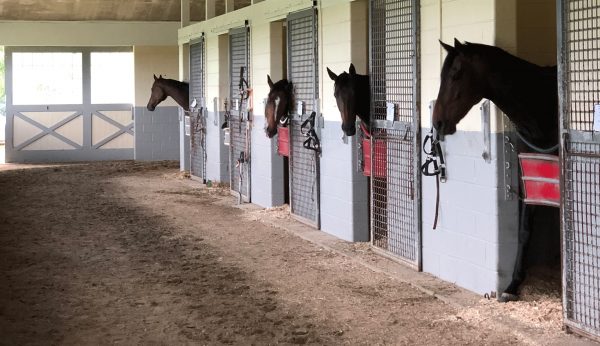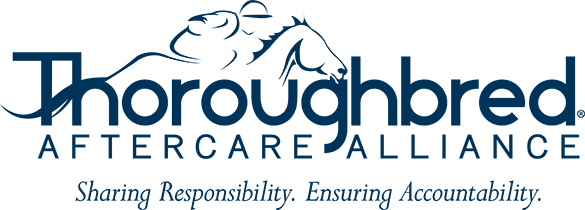Over the past few years, the Thoroughbred aftercare and pro-off-track-Thoroughbred movement has exploded. Not only have the post-racing lives of racehorses become more top of mind for industry participants, but aftercare organizations have also been expanding their facilities, allowing more horses to be served.
For Square Peg, a Thoroughbred Aftercare Alliance-accredited organization in Northern California, growth was a challenging process. The therapeutic riding organization wanted to expand to help more horses and more people but didn’t want to lose the intimate, community feeling of their program.
“If we got bigger than say 20 horses and about 50 families a week, that it would change the experience,” Square Peg founder Joell Dunlap said. “It would start to look more like a commercial lesson or therapy barn and so the challenge was—how do we grow? And we thought, ‘What if we go out and teach other barns to do what we do?’ But that didn’t feel right either.”
However, earlier this year, through a tragedy, the right moment for expansion came along. Square Peg was approached by Kurt Schindler, whose wife Susan Pommer ran Cadence Farm near Sonoma, Calif., until her death in September of 2017. Wanting to honor his late wife and have a positive impact on the community, he asked if Square Peg would be interested in opening a satellite facility at Cadence Farm. The group said yes and agreed to a few caveats from Schindler—the boarders get to stay and so does the farm’s maintenance crew.
“We don’t expect and we don’t ever want another situation exactly like that, but especially with California real estate the way it is, we could not have afforded to walk into an 11-acre property in wine country and say, ‘We want to lease this,'” Dunlap said.
The way the new facility sets up, Dunlap expects Square Peg’s support to families will expand by 25% and the number of Thoroughbreds helped could increase 50%, while expenses will likely increase by 20%.
“Because of the way that the facility sets up, it will set up better for our Thoroughbreds than where we are now. So we contacted CARMA (California Retirement Management Account) right away and told them the whole situation and they’ve been amazing at helping us bring in horses a little bit at a time,” she said.
“(The expected impact) was a surprise. We have the infrastructure built and we’ve been doing this for 14 years … so adding a satellite isn’t really as much in a start-up costs.”
Another big factor that helped Square Peg with expansion was going through the TAA-accreditation process, which made sure their operational procedures were rock solid.
“Going through the TAA accreditation process and needing to make sure that we established protocols, gave us a lot of the road map to build a satellite where we had protocols in place,” Dunlap said. “Especially when it came to fire safety and evacuation, but even our euthanasia protocols, our vaccination protocols, all of those things were already in place but just to be able to print it, put it in a binder, and know that was already established. The accreditation process absolutely helped us with that whole expansion.”
While the situation was different at another TAA-accredited organization on the opposite side of the country, the ability to expand and the confidence in their TAA-accredited program allowed Akindale Thoroughbred Rescue to forge ahead.
“For me, it’s been fantastic,” said Akindale executive director Chris Andrews of going through the TAA accreditation process. “Coming from outside the Thoroughbred world, I can’t explain how much I’ve learned by going through all of the processes.”
Mostly operating as a sanctuary over the years with a small, seasonal adoption program, Akindale, which was founded by and gifted land from John Hettinger, is turning over a new page in its history as Hettinger family has closed the training and breeding center on the property in late 2017 and turned it over to the rescue. This opened up an 18-stall barn with an indoor dirt track, rehab pens, and another eight-stall barn allowing the organization to rehab, retrain and rehome horses, along with providing sanctuary to more than 130 horses as well.
“It has really allowed us to have that game-changing moment here for our program, our ability to rehab and retrain has always been dependent on the New England weather,” Andrews said, adding that Akindale can how rehab up to 18 horses at a time throughout the entire year.
Not only did the TAA accreditation process help Akindale continue to grow, but it also is allowing them to reach out for more funding and give those donors confidence in the organization.
“Anytime we’re talking to potential donors, even if they don’t fully understand what accreditation from the TAA means, once you explain that there’s an outside body that is coming in and assessing your financials, your horse care, your methods, and validating that we are doing everything that we need to do, it instantly resolves any questions from anyone considering donating to our program,” she said.
For the organization, this expansion is also allowing them to reconnect with the Thoroughbred industry as they are now welcoming Thoroughbreds outside of the Akindale family and can now serve more retiring racehorses.
“I’m excited to share the expansion of our program and I’m hoping that it gives us the opportunity to really reconnect with Thoroughbred owners and trainers,” Andrews said. “We have a fantastic relationship with Beyond the Wire and TAKE THE LEAD, but also want the Thoroughbred industry as a whole to know we are here to help.
PHOTO: Akindale Thoroughbred Rescue














